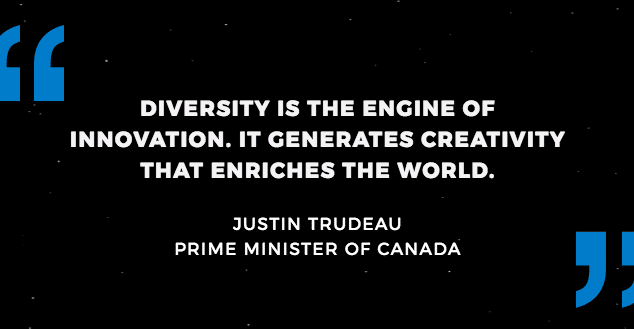Andy Ayim is a Product Manager and investor in working-class founders. He believes there is a huge untapped opportunity with LGBTQ+ community, people of color, and female founders from diverse backgrounds. This piece discusses diversity in tech and how its progression is limited by unequal opportunities and risk.
Risk tolerance is at the core of being an entrepreneur; however, not all risks are created equal. Especially when you are middle class, your background matters.
Aged 4, I have the strap of my helmet firmly keeping my chin in place. My tongue was stuck out to the left of my mouth to help me keep balance. I started pedaling and in my head said, “I am doing it, I am doing it. I am finally riding without training wheels.”
A crack in the pavement caused a wobble, I swerved to the right which caused more turbulence. Before I knew it, I swerved onto the grass and fell to a cushioned landing.
We all know how the rest of the story goes, before long I was back on my bicycle. Within weeks I mastered riding a bicycle without training wheels. Those initial moments of failure were a distant memory, rarely recited until now.
The beauty of learning to ride a bike is that owning, borrowing or renting a bike has now been democratized and made accessible to all in the developed world. We can all learn to ride a bike, even if it means failing a few times along the way in order to do so.
Unequal Access to Risk
When I think about the thought of starting a tech startup, the same opportunity to take risks does not apply. In fact, significant barriers exist for any working class entrepreneur from a diverse background looking to succeed as a founder. Where is the diversity in tech?
A typical startup funding round start with a friend and family round of investment, followed by angel investors. Then venture capital funds a startup from Series A to exit. However, there is a certain class of entrepreneur who is stumbling most at the first funding hurdle. The working class entrepreneur.


Many people rightly note that venture capitalists tend to pattern match against themselves and find founders “sourced from their own networks” as shared by Shauntel Poulson, co-founder of Reach Capital. The truth is, there is an even more elementary problem with the cost of risk for diverse founders. In this article, I will explain this problem and its prevalence.
Background Matters
Too often, I read about origin stories where they raised a “small” $300,000 friends and family venture round. In contrast, I could barely raise $2,000 from my friends (if even that). Like me, my friends are grinding and living from paycheck to paycheck to provide for their family. In fact, the average UK working class family has savings of £95 where for a high-income family it’s £63,000, according to a report by Aviva. I don’t have the savings nor the network with wealthy individuals to call on for funds.
This is a significant barrier as over 90% of successful tech companies follow the same funding journey. Most startups initially receiving funding from friends and family investors, followed by angel investors, and eventually venture capital.
For many startups, raising even $50,000 may seem too meager. For others, this money is easily available through savings and support from friends and family. However, many individuals from working-class backgrounds can’t afford to take the financial risk of becoming an entrepreneur. It is not that these founders are risk-averse but rather many financially can’t afford to take the risk.
Distinct Lack of Diversity in Tech
We frequently come across statistics like: “89% of venture capital goes to men” or “0.2% of funding goes to black women.”
The opportunity and access to financial risk are at the core of being an entrepreneur. And statistics prove venture capitalists will not afford them the opportunity to take risks. We need to rethink how we can redistribute capital to allow wider participation in tech for founders from diverse backgrounds.
Funds such as Backstage Capital, founded by Arlan Hamilton are addressing this issue head-on. In just two and a half years Backstage Capital has invested in 100 underrepresented startups. Each investment is led by an underrepresented founder (person of color, woman, and/or LGBTQ+).
More recently, SheaMoisture founder Richelieu Dennis announced a $100 million fund for women entrepreneurs of color (Essence Ventures) at the 2018 Essence Festival.
The Pressure of the Rockstar Status
We measure ourselves against the funding rounds and valuations made famous by the media. Creating a survivorship bias in society, the media doesn’t reveal the hundreds of thousands of startups that fail every day.
The news reports on unicorn CEOs like rockstars. Jeff Bezos, Mark Zuckerburg, and startups like Airbnb have become the new generation of entrepreneurial and creative rockstars.
This rockstar status can have damaging impact and pressure on founders too, as seen in this year’s fraud case against Theranos founder, Elizabeth Holmes.
The Flattening of Tech Founders
By focusing on these tech rockstars, we tend to forget the long tail of founders trying to make it big.
In the long tail, only 4% of women-owned businesses and 13% of minority-owned businesses received VC funding last year. VC partners are majority white and male, it has increasingly become an exclusive club pattern matching against themselves.
Diversity in tech is still far from where it needs to be. On the one hand, it is great to see new funds invest in early-stage founders with diverse founders. However, investors dramatically need to change their behavior and widen the top of their deal funnel.
Let’s end on a quote from Paul Graham, co-founder of Y-Combinator on how economic inequality affects founders:
“Closely related to poverty is lack of social mobility. I’ve seen this myself: you don’t have to grow up rich or even upper middle class to get rich as a startup founder, but few successful founders grew up desperately poor.”






